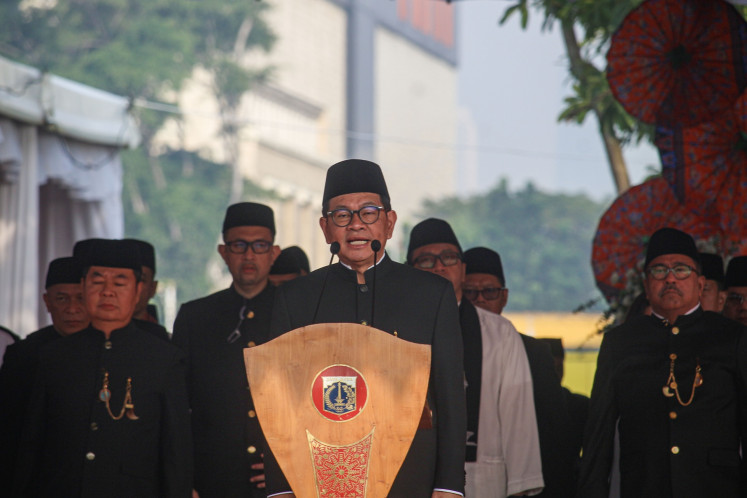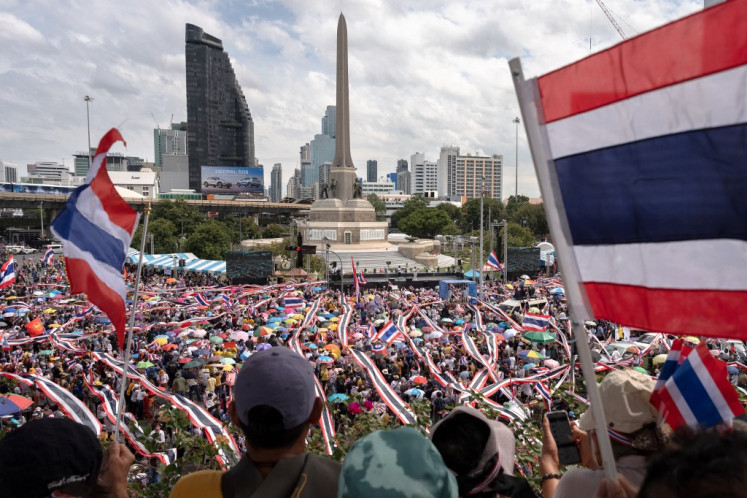Popular Reads
Top Results
Can't find what you're looking for?
View all search resultsPopular Reads
Top Results
Can't find what you're looking for?
View all search resultsReformasi: An analysis on reform agenda of post-Suharto governments
This month, 16 years ago, Indonesia was in a state of perplexity
Change text size
Gift Premium Articles
to Anyone

T
his month, 16 years ago, Indonesia was in a state of perplexity. A combination of ethnic violence, economic crisis and political turmoil promulgated the call for democratic governance, decentralization and to unravel corruption, collusion and nepotism (KKN) practices deeply rooted in the political system.
It can be strongly argued that the call for democratic governance has been successful. This month, 16 years later, Indonesia is about to witness an important milestone in its democratic progress: its third direct presidential election. Yet, questions remain regarding the ability of post-Soeharto governments to really deal with the seemingly embedded KKN mentality in the political system.
Different presidents have different approaches to the reform agenda. Soeharto's successor BJ Habibie's legacy lies in major structural reform primarily in institutionalizing a new political blueprint to suit the voracious demand of Indonesians for democracy. In addition, Habibie laid the foundations for the decentralization of power, shifting power away from the state toward regencies and municipalities.
The post-1999 election presidents, Abdurahman Wahid and Megawati Soekarnoputri further reinforced the foundations laid by Habibie in moving toward greater democracy. The third and fourth amendments of the 1945 Constitution, which stipulated the provision of direct presidential elections, was implemented in the historic 2004 direct presidential election.
The success of the 2004 and 2009 direct elections have signaled the successful reform of the political system. Nonetheless, KKN, as the most important reform agenda, hardly made progress. None of the post-Soeharto presidents were able to eradicate KKN practices in the system. The establishment of the Corruption Eradication Commission (KPK) has not proven to be an effective instrument to actually warn off Indonesian citizens, primarily those who hold public office, from KKN activities. Notorious practices inherited from the Soeharto regime, such as cronyism, still exist. Soeharto's cronies might be gone but new cronies have continued to emerge.
The question on whether Indonesian people have successfully undergone total reform still remains. Increasing numbers of mayors, regents as well as judges in district courts detained for KKN activities highlight the woes of decentralization. Rather than providing more economic power to second-tier regions, decentralization shifted KKN activities from the central to the regional level.
Corruption eradication was made top priority by President Susilo Bambang Yudhoyono's government. KPK's activities increased significantly during the first term of Yudhoyono's presidency in 2004-2009.
Although data seemed to provide positive signals, the increasing amount of cases investigated up to 2014 indicates that the KPK is not effective enough in discouraging corruption. Elites, either from the private or public sector, are not afraid of the risk of being detained by the KPK. This could be due to the seemingly short and 'flexible' prison sentences that have been handed down.
Clearly, the punishment for corruption so far has not been effective as a deterrent to perpetrators. The valuable business-politics relationship established under the Soeharto regime still exists until now, abusing state power for personal gain.
The march toward greater democracy is endless. Radical groups, including terrorists, emerged under the shield of democracy. Freedom of speech is used to launch attacks on government without any form of politeness. Freedom of the press is used by the press to convey biased information to Indonesia people. Negative issues such as KKN are exploited by the media, leaving boast, positive information untouched.
I grew up in an already democratic Indonesia. Younger generations, or people who were just little kids during the reformasi like me, did not experience the system built by the New Order. Nor did we experience the power struggle after the fall of the regime. Organizations such as Indonesia Future Leaders (IFL) and Parlemen Indonesia, spearheaded by Indonesian youths, showed increasing awareness of the youth that we are going to be the backbone of Indonesia's future.
I believe that the younger generations' immunity from the New Order's notorious system will better guide Indonesia toward greater reform realization.
The writer, who is pursuing a Master's degree in international political economy at S. Rajaratnam School of International Studies, Singapore, is volunteering to support Anies Baswedan as a presidential candidate for the 2014 presidential election. The views expressed are his own.









